I, Avatar
By:
December 30, 2009
The last time Pandora opened the box there was kind of a problem. All sorts of uncontrollable wild things got all over the place, everybody started yelling and panicking, and Pandora got into lots of trouble. A lot more than she expected. So she locked the box and put a rug over it and sat on it, because they told her that Hope was still in there and she better not let that out, too! So she’s been being very good and very quiet and sitting on the box and really not getting into any more trouble at all. Right? Not peeking, not fidgeting, just sitting on the box, nothing getting out. Good.
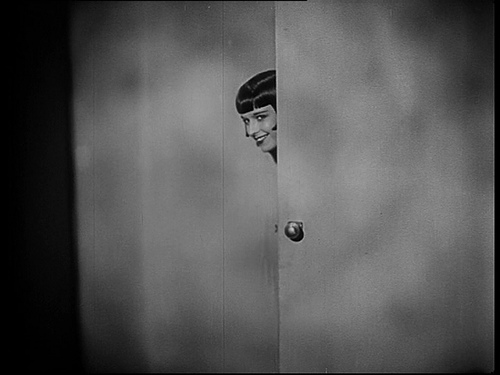
[Louise Brooks in Die Büchse der Pandora, dir. Georg Wilhelm Pabst, 1929]
Except that now there’s kind of a problem again.
You see, with all the excitement and frenzy around things getting out of the box and her getting in trouble and everyone panicking and her getting yelled at and all; well, understandably some things got overlooked. She couldn’t help it, it was all she could do to get the box closed again, and lock it and sit on top of it for good measure! But as it turns out, there’s something else in the box. Something else that didn’t get out, and that Pandora has kept for us all this time. And now, we need to know what it is.
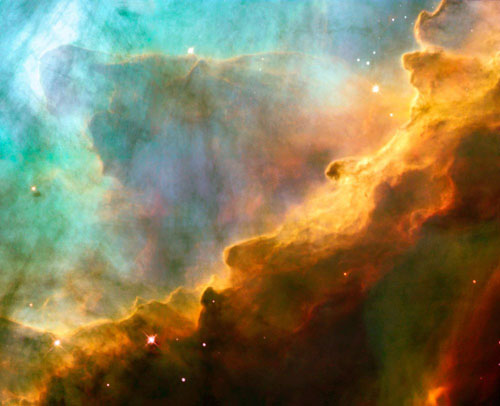
[Image from Hubble Telescope]
Outer space is the great escape, the jumping-off point from the all-too-messy planet, a final divorce of the mind from the body, a rational teleology where everything is clean, logical, and moves at the speed of light, or thought. At least that was the idea. Kubrick’s 2001: A Space Odyssey falls safely within this Cartesian trajectory, where Dave’s final apotheosis occurs far out in space, or “far out” in his mind, and is presented as an evolution from earth and the body into the purely mental realm, where physical distances are as nothing, atmospheres are beautiful mirrored nebulae, and there is room for all the palaces of the imagination one might possibly wish to inhabit.

[Still from 2001: A Space Odyssey, dir. Stanley Kubrick, 1968]
Sun King suites are notably absent from the recent crop of space flicks, Avatar, District 9, and Moon; and what’s more, the aliens have gotten in. All the way in. In District 9, a hideous insectoid precision overwhelms the body while leaving the mind intact to witness the horror; while in Moon, machine-tooled mirror selves wake to bounce balls in perfect sequence.
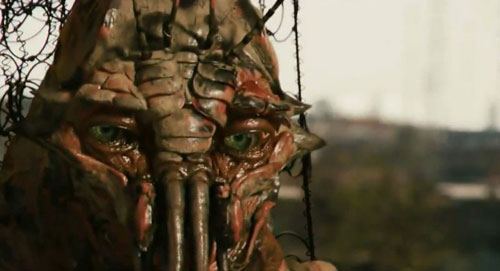
[Still from District 9, dir. Neill Blomkamp, 2009]
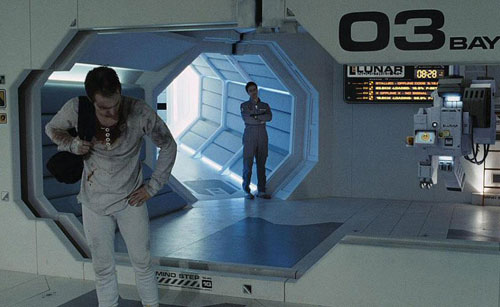
[Still from Moon, dir. Duncan Jones, 2009]
But in Avatar the alienation is ecstatic, a celebration augmented by the beauty of the planet, Pandora, and its entities: bioluminescent plants, airborne feather plankton, symbiont animals sprung from a Fauvist palette, the Na’vi people themselves with pores of glowing and changing constellations: Ma femme à la chevelure de feu de bois…
[Still from Avatar, dir. James Cameron, 2009]
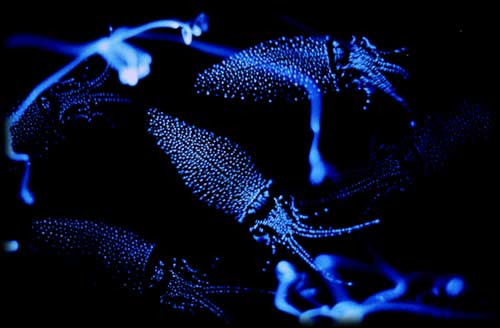
[Bioluminescent squid, Earth]
To wish to evolve away from the body betrays a dangerous ignorance of what the body is. Because what it is, is a mutant: a hodgepodge of cells and information, a nightmare of maintenance and redundancies, an inefficient delicacy in the face of logic, a porous envelope for a magpie’s trash; some glittery, some useless, and related by accidents of proximity. All this is collected together in the scrapbook we call DNA; a language that, despite having only 4 letters, comes trailing etymologies that precede and range beyond the human.

[GenomeDiagram, information visualization application co-authored by Leighton Pritchard and Jennifer White]
(And if this reminds you of a certain other Book, cobbled together from multiple, often contradictory sources so ancient as to be untraceable, which we have declared to be a single, infallible entity — you would not be far wrong.)

[Illuminated page from Gutenberg Bible, collection: British Library]
We can’t escape into some dream of perfection, we have to deal. We are always already mutants. This is an idea that carries within it the seeds of its own implementation: to understand is to start to mutate. Jake Sully (Avatar), Wikus (District 9) and Sam (Moon) are exaggerations to emphasize a point, the products of advanced biotechnology, running the gamut from planned and project-managed, to accidental and “wild.”
[Still from Avatar, dir. James Cameron, 2009]
Significantly, no one gets anything done alone. Only once they have accepted their essential plurality — Jake in his neuro-merge with his avatar, Sam in company with Sam2 (the other revived clone), and Wikus in company with the alien cells in his body — do things start to really happen. And the otherness at the heart of the self is only the beginning: the whole thing is open to manipulation, the entire social contract and everyone in it can be rewritten and mashed up, DNA as collage. Because it always already is.

[L’homme de René Descartes, et la formation du foetus…, René Descartes, publ. 1662]
It’s not all good. Sam and Wikus face catastrophic losses of the self and family; Jake is a paraplegic and has lost his twin brother, and may possibly forfeit the fate of the entire planet. But watching them run, we start to realize that the possibilities for being are much wider for a mutant. Their feats become appropriately cinematic. They break into and out of impenetrable traps. They defeat unstoppable enemies equipped with advanced technology. They forge impossible alliances and make them pay off. And they finally escape from the forces who had trapped them in that box.

[George Reeves as Superman, Adventures of Superman, 1950s TV show]
The superhero is meant to be human, or almost human, but with some larger-than-life capabilities. But what if these capabilities were actually rebranded deficiencies? What if the biotech attachment was actually a prosthetic, needed to partially compensate for some terrible loss? And what if the biotech was at the cellular level – you didn’t lose your arm, but you’re growing a new one from the inside out. Or an entire new self, with of course greater capabilities than your old self. In Avatar, and in the conventional superhero story, this is great! In Moon and District 9, it is — horrifying.
And then it is great.
The mutation spreads, from cells, to self-consciousness, to society. The box is open and everything is flying around, unresolved, unpredictable, uncontained.
[Mashup between 2001: A Space Odyssey, and The League of Gentlemen, British TV series]
You want to try this at home? Go right ahead.
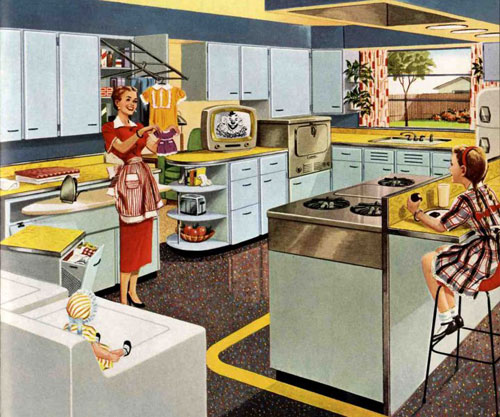
[Kitchenmaid appliances advertisement, 1953]
We’re surrounded by virtual prosthetics, not just propping up a privileged technophile existence, but actually functioning as core, necessary substitutions — sometimes for real things we have forgotten or have let go missing — but sometimes just for themselves.
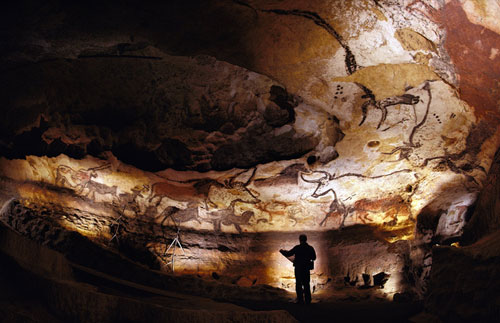
[Photograph by Sisse Brimberg for National Geographic]
We have always had virtual selves, from the minute we imagined anything not in the immediate vicinity, or the other minute when we remembered the location of the winter cave. The minute the future and the past arrived, the minute we drew an arrow or a hand with three fingers on a wall, the minute we spoke, or otherwise communicated to, another being, was the minute we became virtual. I don’t mean the mind/body problem. I mean the mind is the body’s problem, the virtual is literally, physically, real. And we manipulate both when we manipulate one.
[Still from Avatar, dir. James Cameron, 2009]
We’ve externalized so much of the virtual in this, our computerized age, that this is easy to see. Jung once claimed that only a spiritually impoverished age could see the gods as archetypes. But I would turn that on its head, and claim that only a literally virtualized age can show us the extent of what we are, our extended and extensible selves, brilliantly analyzed in Matthew Battles’ Thirteen Ways of Looking at Apollo, previously on HiLobrow.
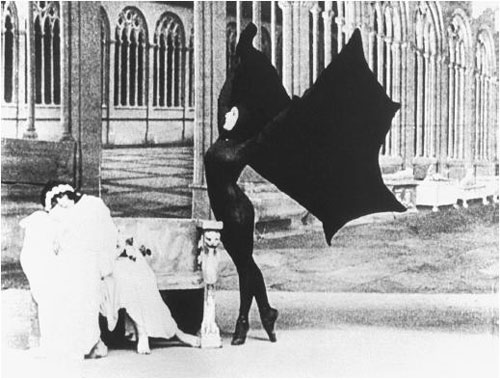
[Still from Les Vampires, dir. Louis Feuillade, 1915]
Yes, yes, the vampires; last summer’s news. But Mina, one of my avatars, would like to point out that our mutant nature is not to be pitied, or cured. It is to be managed, perhaps; and our point of injury may yet become, if not our greatest asset, then at least a portal — although to what, we may not yet know.

[Time Portal from City on the Edge of Forever, the original Star Trek TV series, 1967]
That’s not to say that things are going to work out. No. There are no guarantees, and in truth, sometimes there is actually not much hope. But perhaps you’ve guessed by now the other thing left in the box? More paradoxical, more spectacular, yet more accessible and more constant than Hope: it’s Imagination. It sparks our desires, it inspires our art, it forms our selves. And sometimes, maybe if only for the length of a film, imagination is enough.
After all, it created that box in the first place, right?
Artists in residence archive.
